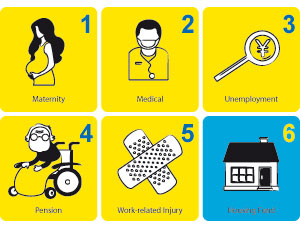Saving Your Labor Costs: Social Insurance Premiums Reduced in China
 By Jake Liddle
By Jake Liddle
For some time now, rising labor costs in China have been setting off alarms among foreign investors. This is mainly due to the country’s increasing minimum wage levels and living standards, as well as its social security system, which has been extensively developed over the past decades. However, as the Central Government exerts pressure to maintain economic growth targets, the costs of employees’ welfare benefits have recently been substantially reduced.
According to the Socioeconomic Development Outline of the 13th Five-Year Plan, maternity insurance and basic medical insurance are very likely to be combined soon. This implies that in the future, China’s insurance schemes will be reduced from the long standing ‘five insurances (i.e., pension, medical insurance, unemployment insurance, maternity insurance, and occupational injury insurance) and one fund (housing fund) plan’, to four insurances and one fund. Meanwhile, various provincial governments have already released new policies to lower different aspects of social security insurance premiums. In this article, we detail the social insurance policies by region, and also look ahead to the future of the Chinese social welfare system and its influence on foreign companies operating in China.
Shanghai
Effective as of January 1 this year, the Shanghai government is reducing the premiums payable by an employer for basic pension insurance and basic medical insurance by one percent and unemployment insurance by 0.5 percent.
Guangzhou
The Guangzhou government announced that as of May 1 this year, the cost of unemployment insurance will be reduced by 1 percent, and requires that in the second half of this year, in order to promote the integration of urban and rural basic medical insurance, unit rates will be gradually reduced to about 5.5 percent.
![]() RELATED: Payroll and Human Resource Services
RELATED: Payroll and Human Resource Services
Tianjin
In early February this year, the Tianjin government launched its first batch of 20 measures and policies to reduce insurance premium rates. The premium payable by an employer for unemployment insurance will be reduced by one percent, maternity insurance will drop to 0.5 percent, and workplace injury insurance lowest standards will drop to 0.2 percent, whilst highest standards stands at 1.9 percent.
Zhejiang Province
Zhejiang decided that the premium payable for an employer of basic medical insurance will reduce by a month’s rate each year, while maternity insurance and workplace injury premiums will drop by 0.2 percent.
Xiamen and Fujian Province
Fujian and Xiamen have released notification that the premium payable by an employer for basic medical insurance will drop by one percent.
Yunnan and Gansu
The provinces of Yunnan and Gansu have also reduced the premiums for unemployment, workplace injury, and maternity insurance policies.
Influence and Future Trends
These adjustments to insurance premiums are expected to alleviate RMB 13.5 billion worth of burden for insurance premium payers. It must be noted that in some regions, not only have premiums been lowered for employer contributions to social security insurance, but also for employees. Of the one percent reduction to unemployment insurance contributions made in Guangzhou, the employer’s rate has dropped from 1.5 percent to 0.8 percent and the employee’s rate has been reduced from 0.5 to 0.2 percent. And in Yunnan, of the one percent total drop in the unemployment insurance premium, the employer’s rate has dropped from two percent to 1.4 percent while the employee’s rate has also been reduced from one to 0.6 percent.
This implies that reductions to insurance premiums will ultimately add volume to employees’ wages. In Yunnan, for example, if an employee’s monthly salary is RMB 5,000, and was previously paying one percent of earnings towards social security, after the 0.6 percent reduction in insurance premiums, they would make an extra RMB 240 per annum.
|
Asia Briefing Ltd. is a subsidiary of Dezan Shira & Associates. Dezan Shira is a specialist foreign direct investment practice, providing corporate establishment, business advisory, tax advisory and compliance, accounting, payroll, due diligence and financial review services to multinationals investing in China, Hong Kong, India, Vietnam, Singapore and the rest of ASEAN. For further information, please email china@dezshira.com or visit www.dezshira.com. Stay up to date with the latest business and investment trends in Asia by subscribing to our complimentary update service featuring news, commentary and regulatory insight. |

 Human Resources and Payroll in China 2015
Human Resources and Payroll in China 2015
This edition of Human Resources and Payroll in China, updated for 2015, provides a firm understanding of China’s laws and regulations related to human resources and payroll management – essential information for foreign investors looking to establish or already running a foreign-invested entity in China, local managers, and HR professionals needing to explain complex points of China’s labor policies.
 Employing Foreign Nationals in China
Employing Foreign Nationals in China
In this issue of China Briefing, we have set out to produce a guide to employing foreign nationals in China, from the initial step of applying for work visas, to more advanced subjects such as determining IIT liability and optimizing employee income packages for tax efficiency. Lastly, recognizing that few foreigners immigrate to China on a permanent basis, we provide an overview of methods for remitting RMB abroad.
Social Insurance in China
In this issue of China Briefing Magazine, we introduce China’s current social insurance system and provide an update on the status of foreigners’ participation in the system. We also include a comprehensive chart of updated average wages across China, which is used to calculate social insurance contribution floors and ceilings. We hope this will give you a better understanding of the system in China.
- Previous Article Meet Yong Bao, and His Impact on Child Product Sales to China
- Next Article China’s Human Capital Capabilities Being Overtaken by ASEAN

























